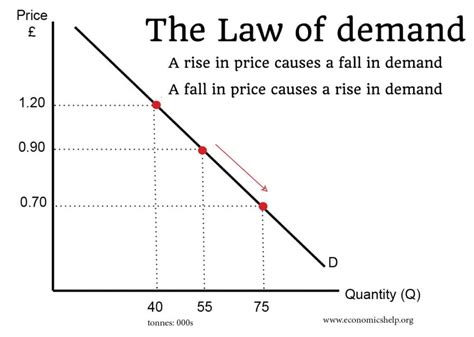The law of demand is a fundamental economic principle that states that, all other factors being equal, the quantity of a good or service demanded decreases as its price increases, and vice versa. This relationship is represented graphically by a downward-sloping demand curve.

There are a number of real-world examples that demonstrate the law of demand. For instance:
- When the price of gasoline rises, people tend to drive less. This is because gasoline becomes more expensive to purchase, so people are less likely to use it for non-essential travel.
- When the price of a new car falls, people tend to buy more cars. This is because the car becomes more affordable, so people are more likely to purchase one.
- When the price of a movie ticket increases, people tend to go to the movies less often. This is because movie tickets become more expensive to purchase, so people are less likely to spend money on them.
These are just a few examples of how the law of demand works in the real world. It is important to understand this concept because it can help you make better decisions about how to price your products or services.
Other factors that can affect demand
In addition to price, there are a number of other factors that can affect demand. These include:
- Income: As people’s incomes increase, they tend to demand more goods and services.
- Tastes and preferences: People’s tastes and preferences can also affect demand. For example, if a new fashion trend becomes popular, demand for that type of clothing will increase.
- Expectations: People’s expectations about the future can also affect demand. For example, if people expect the price of a good or service to increase in the future, they may be more likely to purchase it now.
- Availability of substitutes: The availability of substitutes can also affect demand. For example, if there are a number of different brands of coffee available, people may be less likely to buy a particular brand if the price increases.
Strategies for increasing demand
If you are a business owner, there are a number of strategies you can use to increase demand for your products or services. These include:
- Lowering the price: One of the most effective ways to increase demand is to lower the price. However, it is important to note that you should only do this if you can afford to do so.
- Improving the quality: Another way to increase demand is to improve the quality of your products or services. This will make them more appealing to consumers, and they will be more willing to pay a higher price for them.
- Increasing marketing: Marketing can also be used to increase demand. By creating awareness of your products or services, you can encourage people to purchase them.
- Offering discounts and promotions: Discounts and promotions can also be used to increase demand. These can make your products or services more affordable for consumers, and they may be more likely to purchase them.
Common mistakes to avoid
When trying to increase demand for your products or services, it is important to avoid making the following mistakes:
- Raising the price too much: If you raise the price of your products or services too much, people may be less likely to purchase them.
- Lowering the quality too much: If you lower the quality of your products or services too much, people may be less likely to purchase them.
- Not marketing your products or services: If you do not market your products or services, people may not be aware of them.
- Not offering discounts and promotions: Discounts and promotions can be a great way to increase demand for your products or services.
By understanding the law of demand and the factors that can affect it, you can make better decisions about how to price your products or services, and you can develop strategies to increase demand.
The following tables provide some additional information about the law of demand:
| Price | Quantity Demanded |
|---|---|
| $1.00 | 100 units |
| $2.00 | 75 units |
| $3.00 | 50 units |
| $4.00 | 25 units |
| $5.00 | 10 units |
This table shows the relationship between price and quantity demanded for a hypothetical good. As the price of the good increases, the quantity demanded decreases.
| Factor | Effect on Demand |
|---|---|
| Income | Increases demand |
| Tastes and preferences | Can increase or decrease demand |
| Expectations | Can increase or decrease demand |
| Availability of substitutes | Can decrease demand |
This table shows the effects of different factors on demand.
| Strategy | Effect on Demand |
|---|---|
| Lowering the price | Increases demand |
| Improving the quality | Increases demand |
| Increasing marketing | Increases demand |
| Offering discounts and promotions | Increases demand |
This table shows the effects of different strategies on demand.
| Mistake | Effect on Demand |
|---|---|
| Raising the price too much | Decreases demand |
| Lowering the quality too much | Decreases demand |
| Not marketing your products or services | Decreases demand |
| Not offering discounts and promotions | Decreases demand |
This table shows the effects of different mistakes on demand.
